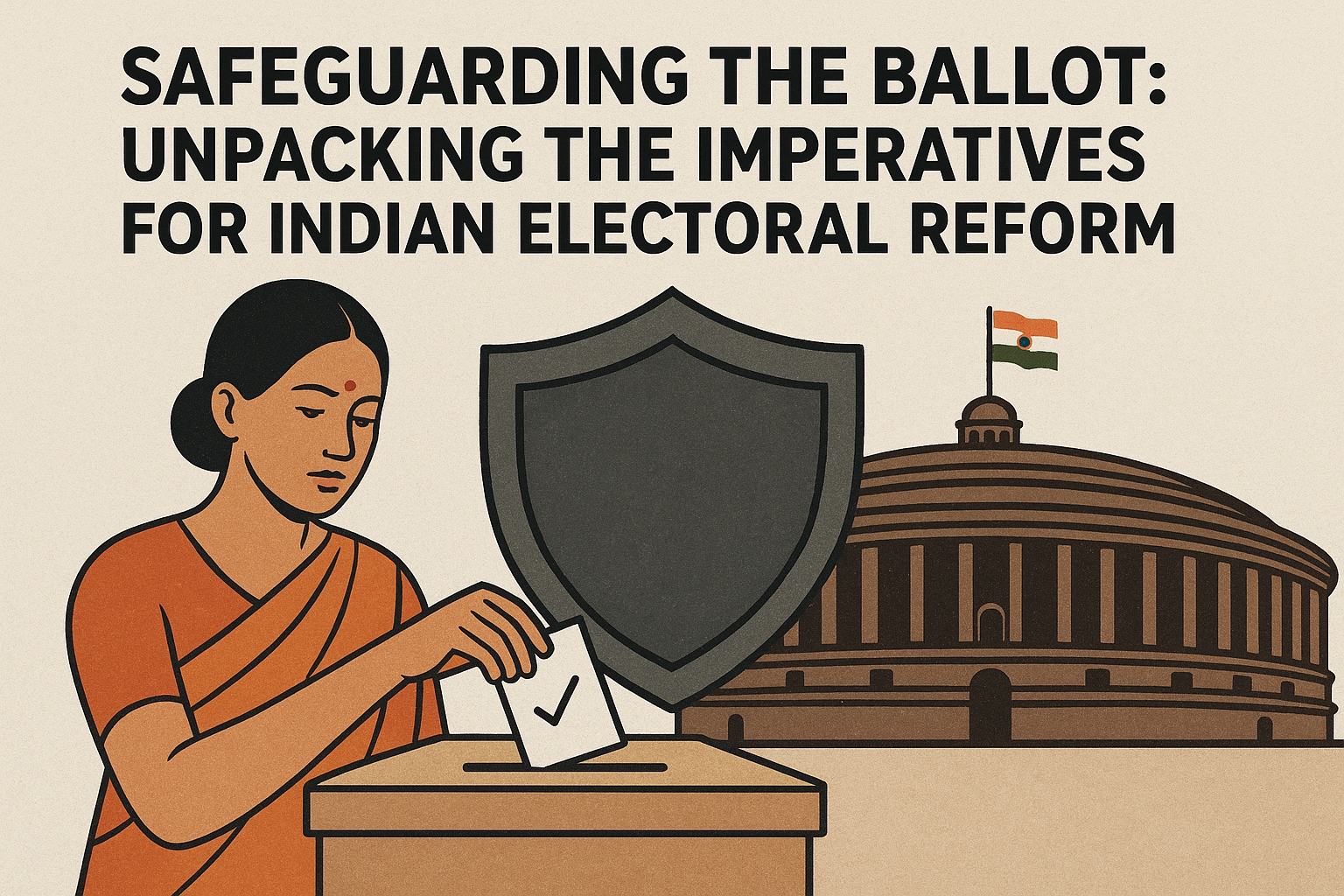Safeguarding the Ballot: Unpacking the Imperatives for Indian Electoral Reform
Vidisha, India – As the world's largest democracy, India’s electoral process is a colossal undertaking, a vibrant testament to the power of the people. Yet, beneath the fanfare and the monumental logistics, lie persistent vulnerabilities that demand urgent attention. Ensuring the purity and fairness of elections is not merely a matter of procedure; it is the bedrock of public trust and the very foundation of the republic.
This article delves into some of the most critical breaches within the Indian election system, drawing on expert analysis and ongoing public discourse, alongside potential resolutions that could fortify our democratic future.
The Shadow of Money and Muscle: Unequal Playing Fields
Perhaps the most insidious challenge facing Indian elections is the pervasive influence of "money and muscle power."
The Breach: The legal expenditure limits set for candidates and parties often appear to be more of a suggestion than a strict mandate. This financial disparity allows wealthier candidates and parties to unleash vast advertising campaigns, organize massive rallies, and, in unfortunate instances, engage in direct voter inducement through illicit means. This not only skews the narrative but also makes it exceedingly difficult for honest, less affluent candidates to compete effectively. Furthermore, the opacity surrounding political party funding continues to be a major concern, often shielding the sources of large donations.
The Resolution: Experts advocate for robust campaign finance reform. This includes bringing political parties under the ambit of the Right to Information (RTI) Act to mandate greater transparency in their funding sources. The Election Commission of India (ECI) requires enhanced powers and technological tools for real-time monitoring and stringent enforcement of expenditure limits. A more radical, yet widely debated, proposal is state funding of elections, where the government provides public funds to parties, thereby reducing reliance on private and potentially illicit sources.
Criminality Creeping In: A Stain on Democracy
The presence of individuals with serious criminal charges in legislative bodies is a grave concern that erodes public faith in the political system.
The Breach: Despite judicial pronouncements, a significant number of candidates facing serious criminal cases, some even heinous, manage to contest and win elections. This not only compromises the integrity of governance but also normalizes criminal elements within the corridors of power, sending a dangerous message to society.
The Resolution: The Supreme Court has mandated disclosure of criminal antecedents, but the need for stronger legislative action is paramount. Amending the Representation of the People Act to explicitly bar individuals with serious charges (not just convictions) from contesting elections is frequently proposed. Such a move would require a rare political consensus, but many believe it's a necessary step to cleanse the political landscape.
The Accuracy Imperative: Flaws in the Electoral Roll
The voter list, the very roster of democracy, is surprisingly susceptible to errors.
The Breach: Inaccurate electoral rolls plague various constituencies. Issues range from duplicate entries and incorrect personal details to, most critically, the wrongful deletion of eligible voters. These inaccuracies can lead to widespread confusion on polling day, voter disenfranchisement, and even open avenues for fraudulent voting practices.
The Resolution: One often-discussed solution, albeit sensitive due to privacy concerns, is Aadhaar-Voter ID linking. Proponents argue this could significantly clean up the rolls by identifying and removing duplicates. However, it must be accompanied by stringent data protection laws. Beyond this, a move towards continuous, technology-driven verification and regular, rigorous door-to-door checks is crucial to maintain highly accurate and up-to-date voter lists.
The Digital Deluge: Battling Disinformation and Fake News
The advent of the digital age has brought a new, formidable adversary: widespread disinformation.
The Breach: Social media platforms, while powerful tools for communication, have become fertile ground for the rapid spread of misinformation, "deepfakes," and targeted fake news campaigns. These can easily manipulate public opinion, inflame communal tensions, and create a distorted reality during critical election periods, posing a direct threat to informed democratic choice.
The Resolution: The ECI needs to forge stronger, more collaborative ties with social media companies to develop swift mechanisms for detecting and removing malicious content. Introducing strict legal penalties for the creation and dissemination of deepfake content and blatant misinformation during elections is also vital. Crucially, proactive voter education campaigns are needed to equip citizens with the critical thinking skills to identify and resist fake news.
Trust in Technology: EVMs and VVPATs
While Electronic Voting Machines (EVMs) combined with Voter Verifiable Paper Audit Trail (VVPAT) have dramatically improved efficiency and curtailed booth capturing, a trust deficit persists among some stakeholders.
The Breach: Despite the ECI's assurances and judicial endorsements, certain political parties and segments of the public still harbor doubts about the absolute infallibility of EVMs, primarily due to the limited scope of physical VVPAT slip verification. This trust deficit, whether founded or not, undermines public confidence in the election results.
The Resolution: To enhance transparency and rebuild trust, proposals include increasing the sample size of VVPAT slips for physical verification based on robust statistical methodologies.
Another idea is the introduction of "totaliser" machines, which would aggregate votes from multiple EVMs before revealing booth-wise results, thereby making it harder to pinpoint how specific localities voted and reducing the potential for post-election intimidation or reprisal.
The Indian electoral system is a dynamic entity, constantly evolving. Addressing these critical breaches requires a concerted effort from all stakeholders – political parties, civil society, the judiciary, and most importantly, an informed citizenry. Only through continuous vigilance and a commitment to reform can India ensure that its elections remain truly free, fair, and a vibrant reflection of its democratic spirit.
